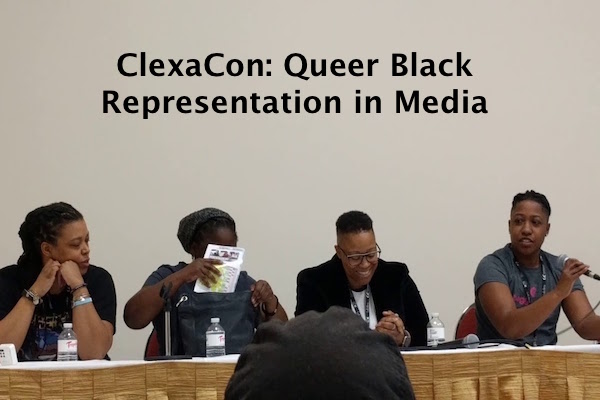Clexacon, the annual convention dedicated to improving the portrayal of LGBTQ women in media, hosted almost one hundred panels over a three day period. Artists, writers, actors, producers, and their fans gathered in Las Vegas the first weekend in April to talk about stories made in our own image. For those of us who couldn’t attend this year, Tagg presents a sampling brought to you in a panel highlight series.
Kia McCall-Barnes (comedian, host) moderated, with panelists Valerie Complex (writer for Black Girl Nerds, The Nerdist, and others), Reign G. (editor and co-founder of Latinx Geeks), LaShawn McGhee (CPO for Revry, Inc.), and our very own Editor-in-Chief, Eboné Bell representing Tagg Magazine. McGhee and Bell are also in Tagg’s panel highlight for “Queer Lady Business.”
Barnes started the panel by saying, “It is no secret that initial endeavors towards LGBTQ rights focused almost exclusively on the concerns of gays who were primarily men, decidedly white, and overwhelmingly middle class.” She asked what can be done to raise queer Black voices.
A short discussion of allyship followed. “I would say to allies, speak up and use your privilege to elevate others,” said Complex. Bell added that people in power are more likely to listen to allies, so they are key to raising queer Black voices. McGhee made sure to add that silent complicity doesn’t make the cut. “My thing with allies is their silence is literally killing people,” she said. “So it’s incredibly important that if you’re in a space, you stop a person from a train of thought they were on and cause them to say, ‘Wait a minute, really?’”
It’s more than just allies, though. Complex highlighted the need for queer Black women to be producers or in boardrooms, because those are doors that often closed. “There’s something to be said about contacts and having leverage,” she said. “We need to give access of opportunity and share connections without trying to get something out of other people’s success.”
McGhee took the mic after, and pointed out that isn’t the only way. “If I’m a little frustrated with trying to break a door, I’m going to build my own door. So my friends and I built our own door,” she said, referencing Revry, Inc., a media network with inclusive queer content for the community. She offered the idea of building doors as a challenge to creatives in the audience. “You got a phone, your phone’s got a camera on it. There are schools, they teach you how to write stuff. Start producing your own stories. Start getting your content ready, [so that] when these doors open–and they are–you need to be ready with your body of work saying, ‘I’m all ready to go, where were you?’”
Reign agreed, adding that, “What [producers] see are dollar signs, ultimately. So if you prove that you can have creative content on YouTube, but also you have 3 million subscribers, they’ll be knocking on your door. So just do you.”
The panel continued, going through topics like queer Black writers in Hollywood, money management, and how to leave a legacy of stories.
For more ClexaCon panel highlights, click here.


